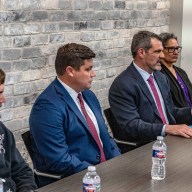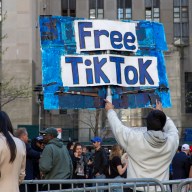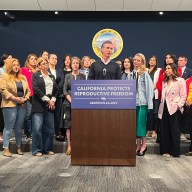BAGHDAD – Iraq took back a remote oil well from Iranian forces and tentatively approved a lucrative oil deal with foreign investors in separate steps Sunday toward shoring up its nascent oil industry in the face of still-existing security pitfalls.
The peaceful end of the standoff at well No. 4 at the southern al-Fakkah oil field capped a tense weekend between Iraq and Iran, uneasy allies that were once at war. But the preliminary deal – between Iraq’s oil ministry and a partnership run by European giant Royal Dutch Shell PLC and Malaysia’s state-run Petronas – was also an important step for Baghdad as it jockeys for a larger piece of the world’s oil profits.
Congratulating Shell-Petronas on the deal to develop one of Iraq’s most prized oil fields, senior deputy oil minister Abdul-Karim Elaibi gloated that the unrelated well standoff, which sparked diplomatic and security concerns, had not scared away the investors.
“Their presence here today … is a great evidence that there is no relation with what happened in the borders with our neighbour, Iran,” Elaibi said.
The contract must still be approved by Iraq’s cabinet before it takes effect. It was signed shortly after Iraqi soldiers escorted about a dozen oil workers back to the al-Fakkah well, which armed Iranian forces had vacated overnight, several government officials said.
Iraqi soldiers planted the Iraqi flag on the well where Iran’s flag had flown during the dispute that began last Thursday. Dozens of Iranian soldiers, however, lingered at a checkpoint not far away.
The well, which is not producing oil, sits about 50 yards (meters) from the Iran-Iraq border. Both countries claim parts of the oil field, and the border itself is under dispute in some places – a problem highlighted by Iranian officials who said the No. 4 well was on Iranian soil.
Officials in Baghdad and Tehran said diplomatic talks about the disputed border would continue. The al-Fakkah well is located about 200 miles (320 kilometres) southeast of Baghdad and has an estimated 1.5 billion barrels in reserves.
It’s not clear why a group of armed Iranians seized the well on Thursday night, and officials offered differing accounts on whether they were soldiers or civilians acting on their own. Political analysts said Iran appeared to be reasserting its dominance over the area’s oil reserves.
In Tehran, the office of Iranian Foreign Minister Manouchehr Mottaki said he and his Iraqi counterpart, Hoshyar Zebari, discussed the case in a phone conversation late Saturday. Mottaki said Iran was committed to talks with Iraq through a joint border committee and blamed “foreign elements” for causing disruption, according to a statement on his office’s Web site.
The incident was just one of the latest security incidents to face Iraq’s fledgling oil industry. Up north, an overnight bomb attack outside of Mosul halted pumping on Iraq’s largest crude oil export line, Oil Ministry spokesman Assem Jihad said.
It was not immediately clear whether pumping for the Kirkuk-Ceyhan pipeline had restarted Sunday night. The line has been attacked repeatedly by insurgents and can carry more than 400,000 barrels of oil a day.
Even so, foreign investors aren’t likely to be deterred by security concerns against the cash crop that Iraq’s largely untapped oil reserves represent. Iraq is believed to have the third-largest reserves in the world, following only Saudi Arabia and Iran, and the problems experienced with Iran over the weekend are small in comparison to the kidnappings, shootings and bombings that scared investors away just a few years ago.
“They know the oil is there – all they’ve got to do is bring it out of the ground,” said Robert Ebel, a senior energy and national security adviser at the Center for Strategic and International Studies think-tank in Washington. “Oil companies have been handling risk issues all of their lives. And unless you’ve got senior management that is risk-adverse, there is not going to be any hesitancy about going into Iraq.”
The Shell-Petronas deal is widely viewed as a boon to Iraq’s postwar recovery. It was one of 10 deals that Iraq awarded to foreign investors in two bidding rounds aimed at increasing the country’s oil production to 12 million barrels a day within six years.
Iraq has not been able to raise output to even close to pre-2003 levels and, with outdated technology, is limping along at roughly 2.5 million barrels per day. That’s well short of Iraq’s goal of joining the ranks of other heavyweight members of the Organization of Petroleum Exporting Countries.
Shell-Petronas won the right to develop the southern Majnoon oil field, which holds 12.5 billion barrels of estimated reserves. The two companies plan to raise production to 1.8 million barrels daily, up from the current 45,900 barrels per day.
Prime Minister Nouri al-Maliki, a Shiite who is running for re-election in March, was conspicuously silent throughout the al-Fakkah well dispute. He had no plans to discuss it with Iranian parliament speaker Ali Larijani at a Cairo meeting of Islamic countries’ lawmakers, said spokesman Ali al-Dabbagh.
Sunni lawmakers Sunday called the oil well standoff an example of Iran trying to smother Iraq’s ascent in the oil world, a not-too-subtle attack on al-Maliki’s silence on the issue. Opponents have accused al-Maliki of being too cozy with Tehran, although other prominent politicians are much closer to Iran.
“The Iranian occupation of the oil well is a continuation of their interference in the Iraqi affairs faced by an obvious government weakness,” said Sunni lawmaker Saleh al-Mutlaq. He accused “some political parties which have alliances with Tehran.”
–
Associated Press Writers Lara Jakes in Baghdad and Nasser Karimi in Tehran contributed to this report.
















